ISY3005: Reflective Journal on Knowledge Management (Omotayo 2015)
VerifiedAdded on 2023/05/30
|8
|1842
|469
Report
AI Summary
This reflective journal analyzes the academic article "Knowledge Management as an important tool in Organisational Management" by Omotayo (2015). The student explores the core concept of Knowledge Management (KM) as a critical driver of organizational success, discussing KM frameworks, theories, and the importance of KM in fostering competitiveness and profitability. The journal critically evaluates the article's research, credibility, and potential biases, while also reflecting on the article's influence on the student's understanding of KM's role in personal and professional development. The student highlights the significance of KM in enhancing productivity, reducing operational costs, and improving organizational efficiency. The reflection also extends to the applicability of KM in educational institutions and government bodies, emphasizing its potential for positive societal impact. The conclusion reinforces the importance of integrating technology, processes, and, most importantly, the knowledge of employees to achieve sustainable competitive advantage and organizational success.
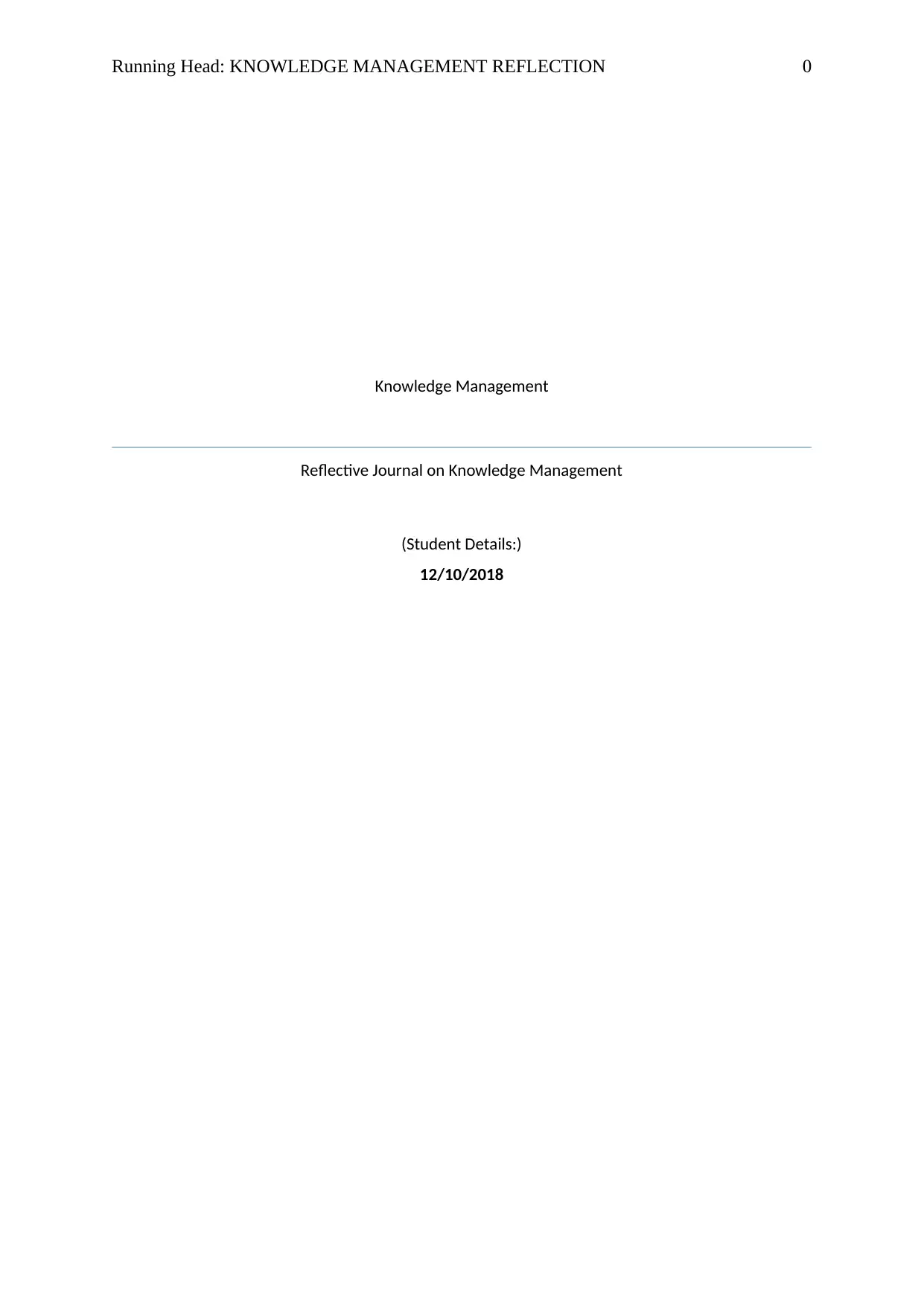
Running Head: KNOWLEDGE MANAGEMENT REFLECTION 0
Knowledge Management
Reflective Journal on Knowledge Management
(Student Details:)
12/10/2018
Knowledge Management
Reflective Journal on Knowledge Management
(Student Details:)
12/10/2018
Paraphrase This Document
Need a fresh take? Get an instant paraphrase of this document with our AI Paraphraser
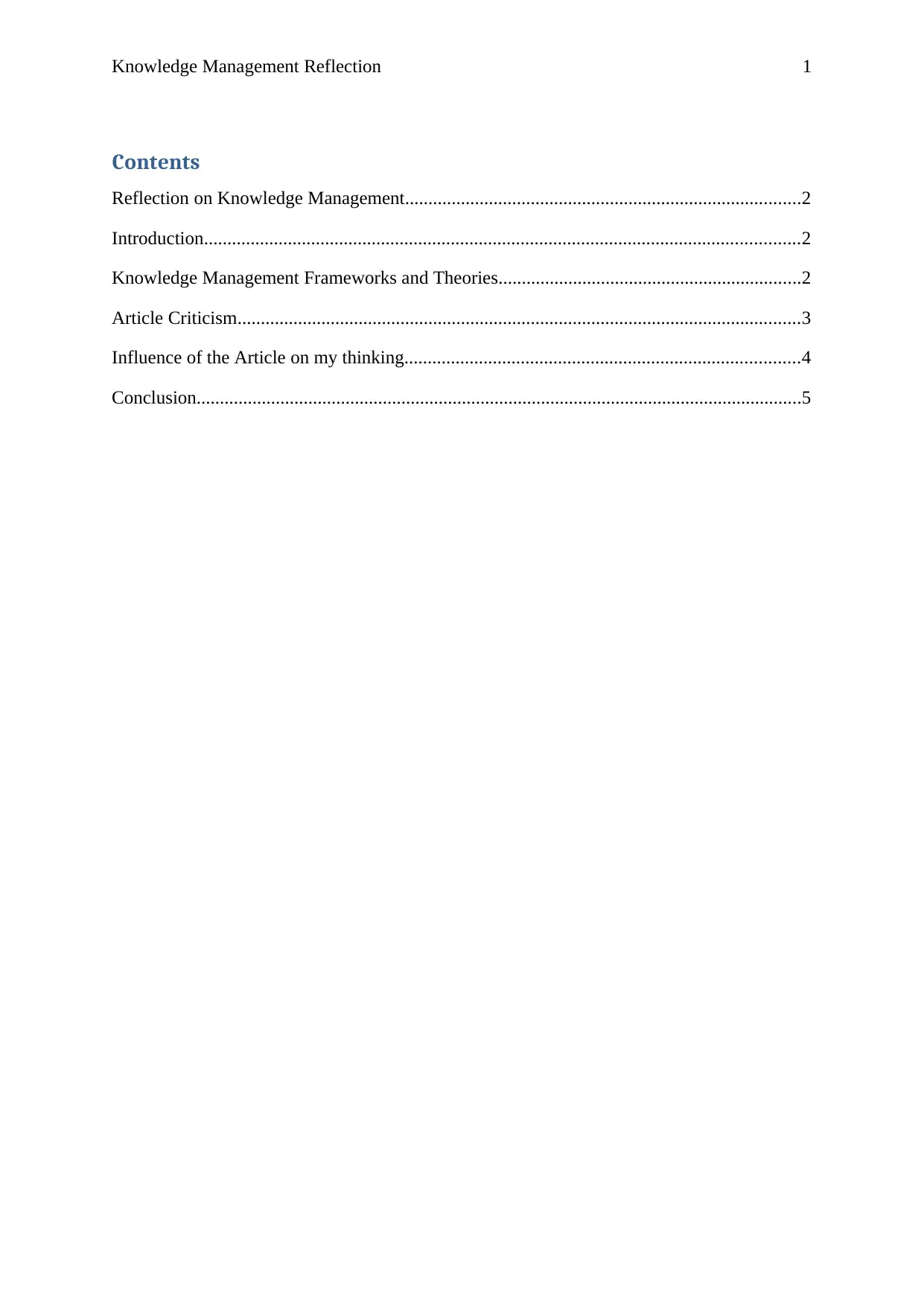
Knowledge Management Reflection 1
Contents
Reflection on Knowledge Management.....................................................................................2
Introduction................................................................................................................................2
Knowledge Management Frameworks and Theories.................................................................2
Article Criticism.........................................................................................................................3
Influence of the Article on my thinking.....................................................................................4
Conclusion..................................................................................................................................5
Contents
Reflection on Knowledge Management.....................................................................................2
Introduction................................................................................................................................2
Knowledge Management Frameworks and Theories.................................................................2
Article Criticism.........................................................................................................................3
Influence of the Article on my thinking.....................................................................................4
Conclusion..................................................................................................................................5
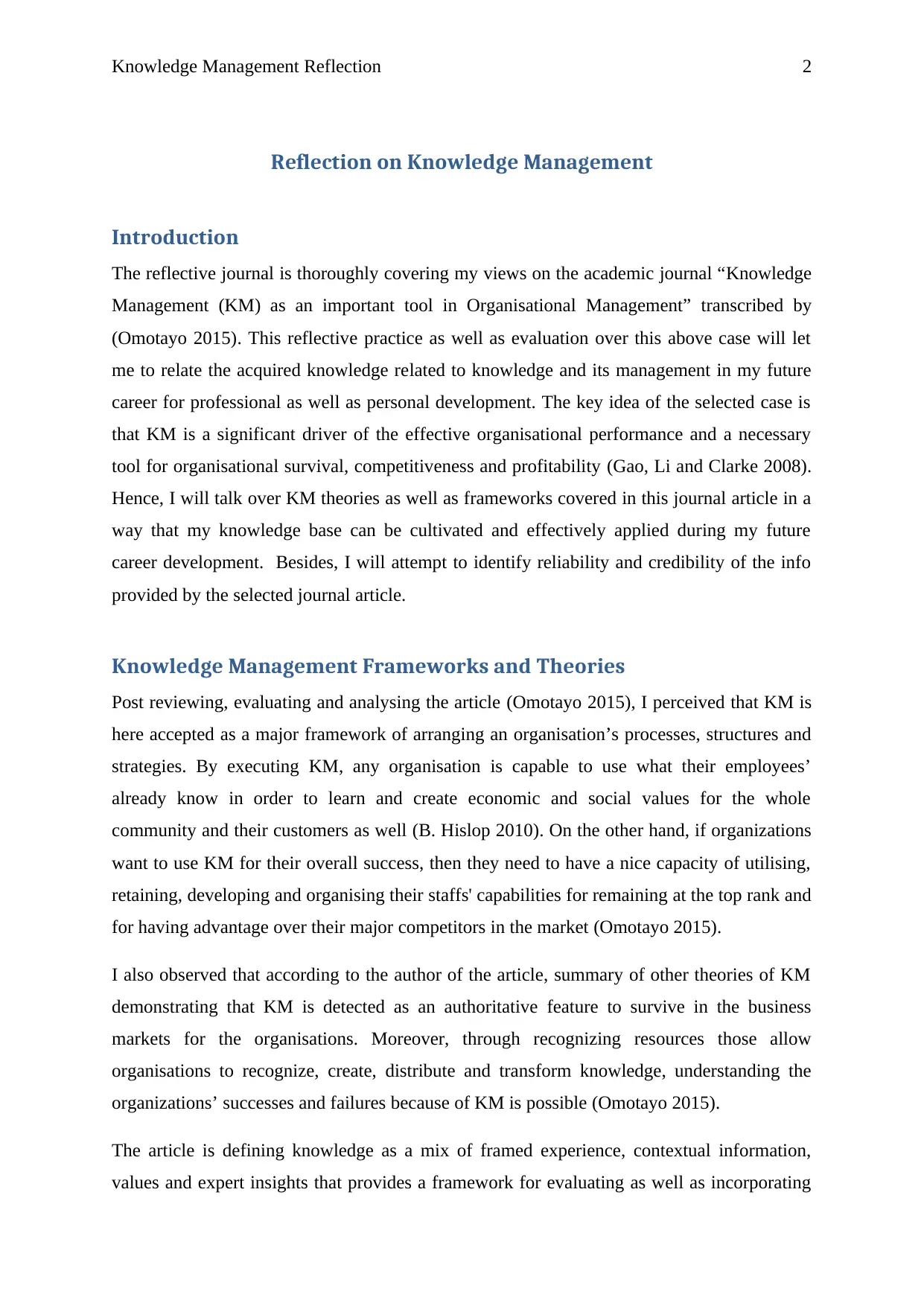
Knowledge Management Reflection 2
Reflection on Knowledge Management
Introduction
The reflective journal is thoroughly covering my views on the academic journal “Knowledge
Management (KM) as an important tool in Organisational Management” transcribed by
(Omotayo 2015). This reflective practice as well as evaluation over this above case will let
me to relate the acquired knowledge related to knowledge and its management in my future
career for professional as well as personal development. The key idea of the selected case is
that KM is a significant driver of the effective organisational performance and a necessary
tool for organisational survival, competitiveness and profitability (Gao, Li and Clarke 2008).
Hence, I will talk over KM theories as well as frameworks covered in this journal article in a
way that my knowledge base can be cultivated and effectively applied during my future
career development. Besides, I will attempt to identify reliability and credibility of the info
provided by the selected journal article.
Knowledge Management Frameworks and Theories
Post reviewing, evaluating and analysing the article (Omotayo 2015), I perceived that KM is
here accepted as a major framework of arranging an organisation’s processes, structures and
strategies. By executing KM, any organisation is capable to use what their employees’
already know in order to learn and create economic and social values for the whole
community and their customers as well (B. Hislop 2010). On the other hand, if organizations
want to use KM for their overall success, then they need to have a nice capacity of utilising,
retaining, developing and organising their staffs' capabilities for remaining at the top rank and
for having advantage over their major competitors in the market (Omotayo 2015).
I also observed that according to the author of the article, summary of other theories of KM
demonstrating that KM is detected as an authoritative feature to survive in the business
markets for the organisations. Moreover, through recognizing resources those allow
organisations to recognize, create, distribute and transform knowledge, understanding the
organizations’ successes and failures because of KM is possible (Omotayo 2015).
The article is defining knowledge as a mix of framed experience, contextual information,
values and expert insights that provides a framework for evaluating as well as incorporating
Reflection on Knowledge Management
Introduction
The reflective journal is thoroughly covering my views on the academic journal “Knowledge
Management (KM) as an important tool in Organisational Management” transcribed by
(Omotayo 2015). This reflective practice as well as evaluation over this above case will let
me to relate the acquired knowledge related to knowledge and its management in my future
career for professional as well as personal development. The key idea of the selected case is
that KM is a significant driver of the effective organisational performance and a necessary
tool for organisational survival, competitiveness and profitability (Gao, Li and Clarke 2008).
Hence, I will talk over KM theories as well as frameworks covered in this journal article in a
way that my knowledge base can be cultivated and effectively applied during my future
career development. Besides, I will attempt to identify reliability and credibility of the info
provided by the selected journal article.
Knowledge Management Frameworks and Theories
Post reviewing, evaluating and analysing the article (Omotayo 2015), I perceived that KM is
here accepted as a major framework of arranging an organisation’s processes, structures and
strategies. By executing KM, any organisation is capable to use what their employees’
already know in order to learn and create economic and social values for the whole
community and their customers as well (B. Hislop 2010). On the other hand, if organizations
want to use KM for their overall success, then they need to have a nice capacity of utilising,
retaining, developing and organising their staffs' capabilities for remaining at the top rank and
for having advantage over their major competitors in the market (Omotayo 2015).
I also observed that according to the author of the article, summary of other theories of KM
demonstrating that KM is detected as an authoritative feature to survive in the business
markets for the organisations. Moreover, through recognizing resources those allow
organisations to recognize, create, distribute and transform knowledge, understanding the
organizations’ successes and failures because of KM is possible (Omotayo 2015).
The article is defining knowledge as a mix of framed experience, contextual information,
values and expert insights that provides a framework for evaluating as well as incorporating
⊘ This is a preview!⊘
Do you want full access?
Subscribe today to unlock all pages.

Trusted by 1+ million students worldwide
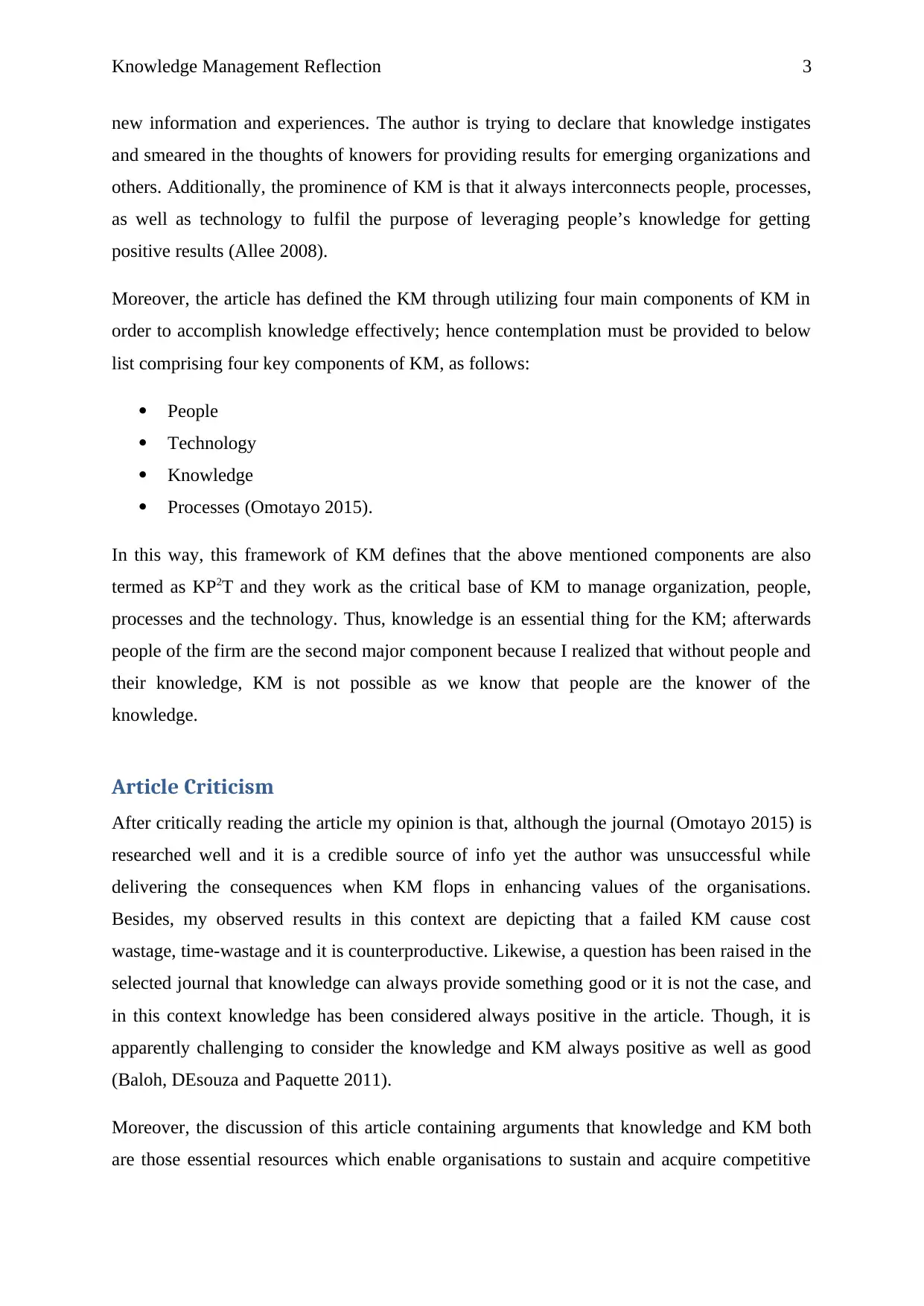
Knowledge Management Reflection 3
new information and experiences. The author is trying to declare that knowledge instigates
and smeared in the thoughts of knowers for providing results for emerging organizations and
others. Additionally, the prominence of KM is that it always interconnects people, processes,
as well as technology to fulfil the purpose of leveraging people’s knowledge for getting
positive results (Allee 2008).
Moreover, the article has defined the KM through utilizing four main components of KM in
order to accomplish knowledge effectively; hence contemplation must be provided to below
list comprising four key components of KM, as follows:
People
Technology
Knowledge
Processes (Omotayo 2015).
In this way, this framework of KM defines that the above mentioned components are also
termed as KP2T and they work as the critical base of KM to manage organization, people,
processes and the technology. Thus, knowledge is an essential thing for the KM; afterwards
people of the firm are the second major component because I realized that without people and
their knowledge, KM is not possible as we know that people are the knower of the
knowledge.
Article Criticism
After critically reading the article my opinion is that, although the journal (Omotayo 2015) is
researched well and it is a credible source of info yet the author was unsuccessful while
delivering the consequences when KM flops in enhancing values of the organisations.
Besides, my observed results in this context are depicting that a failed KM cause cost
wastage, time-wastage and it is counterproductive. Likewise, a question has been raised in the
selected journal that knowledge can always provide something good or it is not the case, and
in this context knowledge has been considered always positive in the article. Though, it is
apparently challenging to consider the knowledge and KM always positive as well as good
(Baloh, DEsouza and Paquette 2011).
Moreover, the discussion of this article containing arguments that knowledge and KM both
are those essential resources which enable organisations to sustain and acquire competitive
new information and experiences. The author is trying to declare that knowledge instigates
and smeared in the thoughts of knowers for providing results for emerging organizations and
others. Additionally, the prominence of KM is that it always interconnects people, processes,
as well as technology to fulfil the purpose of leveraging people’s knowledge for getting
positive results (Allee 2008).
Moreover, the article has defined the KM through utilizing four main components of KM in
order to accomplish knowledge effectively; hence contemplation must be provided to below
list comprising four key components of KM, as follows:
People
Technology
Knowledge
Processes (Omotayo 2015).
In this way, this framework of KM defines that the above mentioned components are also
termed as KP2T and they work as the critical base of KM to manage organization, people,
processes and the technology. Thus, knowledge is an essential thing for the KM; afterwards
people of the firm are the second major component because I realized that without people and
their knowledge, KM is not possible as we know that people are the knower of the
knowledge.
Article Criticism
After critically reading the article my opinion is that, although the journal (Omotayo 2015) is
researched well and it is a credible source of info yet the author was unsuccessful while
delivering the consequences when KM flops in enhancing values of the organisations.
Besides, my observed results in this context are depicting that a failed KM cause cost
wastage, time-wastage and it is counterproductive. Likewise, a question has been raised in the
selected journal that knowledge can always provide something good or it is not the case, and
in this context knowledge has been considered always positive in the article. Though, it is
apparently challenging to consider the knowledge and KM always positive as well as good
(Baloh, DEsouza and Paquette 2011).
Moreover, the discussion of this article containing arguments that knowledge and KM both
are those essential resources which enable organisations to sustain and acquire competitive
Paraphrase This Document
Need a fresh take? Get an instant paraphrase of this document with our AI Paraphraser
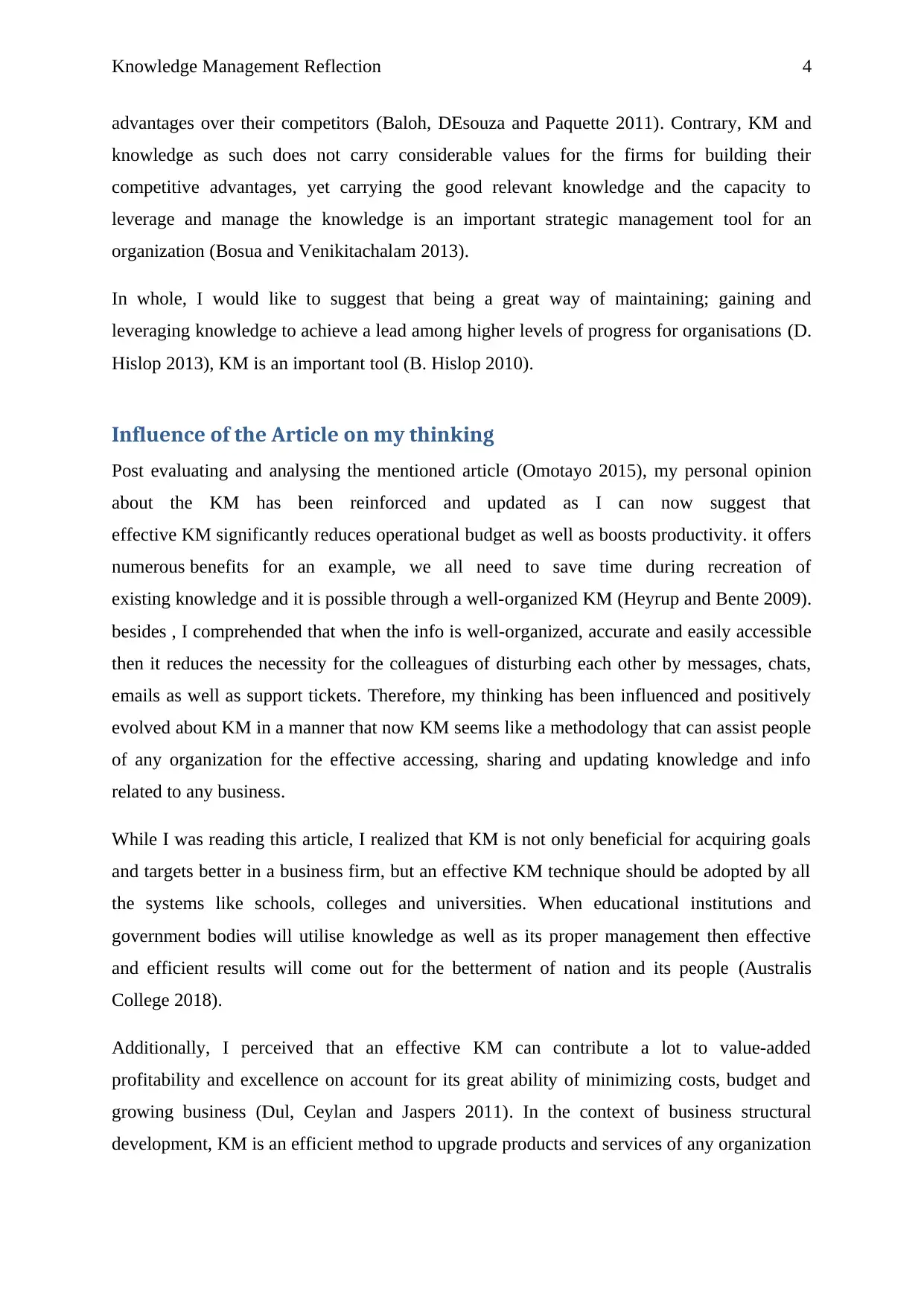
Knowledge Management Reflection 4
advantages over their competitors (Baloh, DEsouza and Paquette 2011). Contrary, KM and
knowledge as such does not carry considerable values for the firms for building their
competitive advantages, yet carrying the good relevant knowledge and the capacity to
leverage and manage the knowledge is an important strategic management tool for an
organization (Bosua and Venikitachalam 2013).
In whole, I would like to suggest that being a great way of maintaining; gaining and
leveraging knowledge to achieve a lead among higher levels of progress for organisations (D.
Hislop 2013), KM is an important tool (B. Hislop 2010).
Influence of the Article on my thinking
Post evaluating and analysing the mentioned article (Omotayo 2015), my personal opinion
about the KM has been reinforced and updated as I can now suggest that
effective KM significantly reduces operational budget as well as boosts productivity. it offers
numerous benefits for an example, we all need to save time during recreation of
existing knowledge and it is possible through a well-organized KM (Heyrup and Bente 2009).
besides , I comprehended that when the info is well-organized, accurate and easily accessible
then it reduces the necessity for the colleagues of disturbing each other by messages, chats,
emails as well as support tickets. Therefore, my thinking has been influenced and positively
evolved about KM in a manner that now KM seems like a methodology that can assist people
of any organization for the effective accessing, sharing and updating knowledge and info
related to any business.
While I was reading this article, I realized that KM is not only beneficial for acquiring goals
and targets better in a business firm, but an effective KM technique should be adopted by all
the systems like schools, colleges and universities. When educational institutions and
government bodies will utilise knowledge as well as its proper management then effective
and efficient results will come out for the betterment of nation and its people (Australis
College 2018).
Additionally, I perceived that an effective KM can contribute a lot to value-added
profitability and excellence on account for its great ability of minimizing costs, budget and
growing business (Dul, Ceylan and Jaspers 2011). In the context of business structural
development, KM is an efficient method to upgrade products and services of any organization
advantages over their competitors (Baloh, DEsouza and Paquette 2011). Contrary, KM and
knowledge as such does not carry considerable values for the firms for building their
competitive advantages, yet carrying the good relevant knowledge and the capacity to
leverage and manage the knowledge is an important strategic management tool for an
organization (Bosua and Venikitachalam 2013).
In whole, I would like to suggest that being a great way of maintaining; gaining and
leveraging knowledge to achieve a lead among higher levels of progress for organisations (D.
Hislop 2013), KM is an important tool (B. Hislop 2010).
Influence of the Article on my thinking
Post evaluating and analysing the mentioned article (Omotayo 2015), my personal opinion
about the KM has been reinforced and updated as I can now suggest that
effective KM significantly reduces operational budget as well as boosts productivity. it offers
numerous benefits for an example, we all need to save time during recreation of
existing knowledge and it is possible through a well-organized KM (Heyrup and Bente 2009).
besides , I comprehended that when the info is well-organized, accurate and easily accessible
then it reduces the necessity for the colleagues of disturbing each other by messages, chats,
emails as well as support tickets. Therefore, my thinking has been influenced and positively
evolved about KM in a manner that now KM seems like a methodology that can assist people
of any organization for the effective accessing, sharing and updating knowledge and info
related to any business.
While I was reading this article, I realized that KM is not only beneficial for acquiring goals
and targets better in a business firm, but an effective KM technique should be adopted by all
the systems like schools, colleges and universities. When educational institutions and
government bodies will utilise knowledge as well as its proper management then effective
and efficient results will come out for the betterment of nation and its people (Australis
College 2018).
Additionally, I perceived that an effective KM can contribute a lot to value-added
profitability and excellence on account for its great ability of minimizing costs, budget and
growing business (Dul, Ceylan and Jaspers 2011). In the context of business structural
development, KM is an efficient method to upgrade products and services of any organization
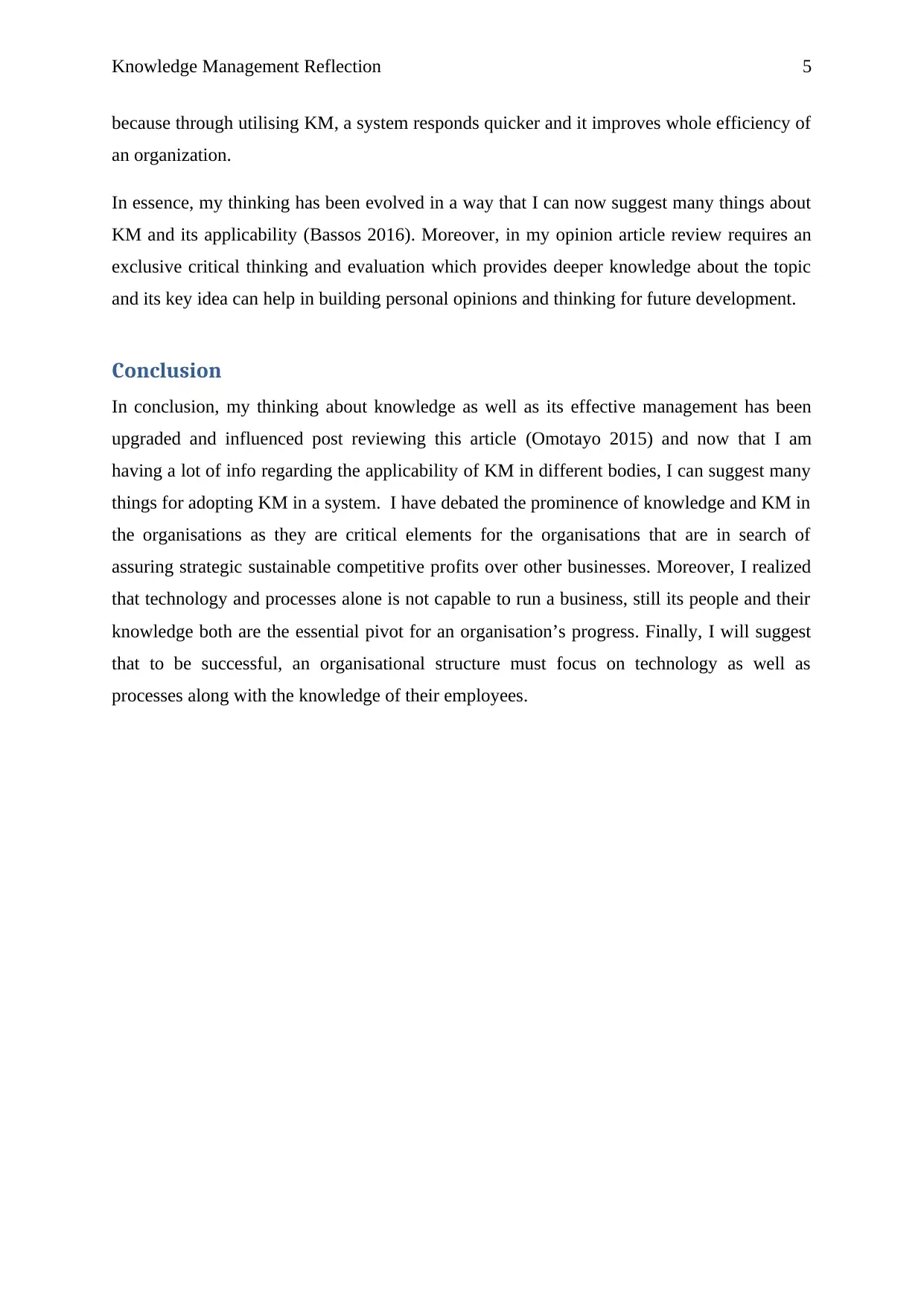
Knowledge Management Reflection 5
because through utilising KM, a system responds quicker and it improves whole efficiency of
an organization.
In essence, my thinking has been evolved in a way that I can now suggest many things about
KM and its applicability (Bassos 2016). Moreover, in my opinion article review requires an
exclusive critical thinking and evaluation which provides deeper knowledge about the topic
and its key idea can help in building personal opinions and thinking for future development.
Conclusion
In conclusion, my thinking about knowledge as well as its effective management has been
upgraded and influenced post reviewing this article (Omotayo 2015) and now that I am
having a lot of info regarding the applicability of KM in different bodies, I can suggest many
things for adopting KM in a system. I have debated the prominence of knowledge and KM in
the organisations as they are critical elements for the organisations that are in search of
assuring strategic sustainable competitive profits over other businesses. Moreover, I realized
that technology and processes alone is not capable to run a business, still its people and their
knowledge both are the essential pivot for an organisation’s progress. Finally, I will suggest
that to be successful, an organisational structure must focus on technology as well as
processes along with the knowledge of their employees.
because through utilising KM, a system responds quicker and it improves whole efficiency of
an organization.
In essence, my thinking has been evolved in a way that I can now suggest many things about
KM and its applicability (Bassos 2016). Moreover, in my opinion article review requires an
exclusive critical thinking and evaluation which provides deeper knowledge about the topic
and its key idea can help in building personal opinions and thinking for future development.
Conclusion
In conclusion, my thinking about knowledge as well as its effective management has been
upgraded and influenced post reviewing this article (Omotayo 2015) and now that I am
having a lot of info regarding the applicability of KM in different bodies, I can suggest many
things for adopting KM in a system. I have debated the prominence of knowledge and KM in
the organisations as they are critical elements for the organisations that are in search of
assuring strategic sustainable competitive profits over other businesses. Moreover, I realized
that technology and processes alone is not capable to run a business, still its people and their
knowledge both are the essential pivot for an organisation’s progress. Finally, I will suggest
that to be successful, an organisational structure must focus on technology as well as
processes along with the knowledge of their employees.
⊘ This is a preview!⊘
Do you want full access?
Subscribe today to unlock all pages.

Trusted by 1+ million students worldwide
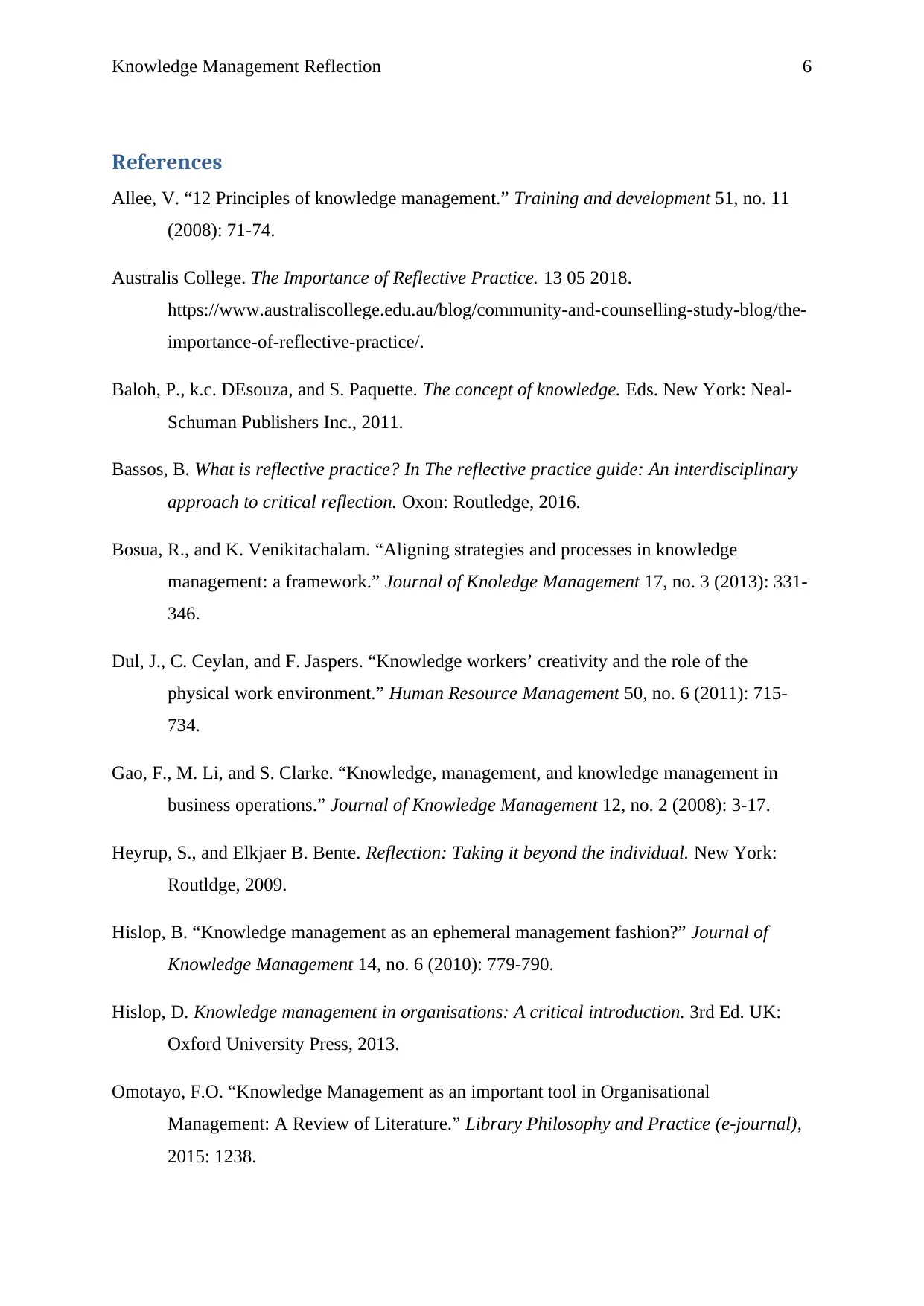
Knowledge Management Reflection 6
References
Allee, V. “12 Principles of knowledge management.” Training and development 51, no. 11
(2008): 71-74.
Australis College. The Importance of Reflective Practice. 13 05 2018.
https://www.australiscollege.edu.au/blog/community-and-counselling-study-blog/the-
importance-of-reflective-practice/.
Baloh, P., k.c. DEsouza, and S. Paquette. The concept of knowledge. Eds. New York: Neal-
Schuman Publishers Inc., 2011.
Bassos, B. What is reflective practice? In The reflective practice guide: An interdisciplinary
approach to critical reflection. Oxon: Routledge, 2016.
Bosua, R., and K. Venikitachalam. “Aligning strategies and processes in knowledge
management: a framework.” Journal of Knoledge Management 17, no. 3 (2013): 331-
346.
Dul, J., C. Ceylan, and F. Jaspers. “Knowledge workers’ creativity and the role of the
physical work environment.” Human Resource Management 50, no. 6 (2011): 715-
734.
Gao, F., M. Li, and S. Clarke. “Knowledge, management, and knowledge management in
business operations.” Journal of Knowledge Management 12, no. 2 (2008): 3-17.
Heyrup, S., and Elkjaer B. Bente. Reflection: Taking it beyond the individual. New York:
Routldge, 2009.
Hislop, B. “Knowledge management as an ephemeral management fashion?” Journal of
Knowledge Management 14, no. 6 (2010): 779-790.
Hislop, D. Knowledge management in organisations: A critical introduction. 3rd Ed. UK:
Oxford University Press, 2013.
Omotayo, F.O. “Knowledge Management as an important tool in Organisational
Management: A Review of Literature.” Library Philosophy and Practice (e-journal),
2015: 1238.
References
Allee, V. “12 Principles of knowledge management.” Training and development 51, no. 11
(2008): 71-74.
Australis College. The Importance of Reflective Practice. 13 05 2018.
https://www.australiscollege.edu.au/blog/community-and-counselling-study-blog/the-
importance-of-reflective-practice/.
Baloh, P., k.c. DEsouza, and S. Paquette. The concept of knowledge. Eds. New York: Neal-
Schuman Publishers Inc., 2011.
Bassos, B. What is reflective practice? In The reflective practice guide: An interdisciplinary
approach to critical reflection. Oxon: Routledge, 2016.
Bosua, R., and K. Venikitachalam. “Aligning strategies and processes in knowledge
management: a framework.” Journal of Knoledge Management 17, no. 3 (2013): 331-
346.
Dul, J., C. Ceylan, and F. Jaspers. “Knowledge workers’ creativity and the role of the
physical work environment.” Human Resource Management 50, no. 6 (2011): 715-
734.
Gao, F., M. Li, and S. Clarke. “Knowledge, management, and knowledge management in
business operations.” Journal of Knowledge Management 12, no. 2 (2008): 3-17.
Heyrup, S., and Elkjaer B. Bente. Reflection: Taking it beyond the individual. New York:
Routldge, 2009.
Hislop, B. “Knowledge management as an ephemeral management fashion?” Journal of
Knowledge Management 14, no. 6 (2010): 779-790.
Hislop, D. Knowledge management in organisations: A critical introduction. 3rd Ed. UK:
Oxford University Press, 2013.
Omotayo, F.O. “Knowledge Management as an important tool in Organisational
Management: A Review of Literature.” Library Philosophy and Practice (e-journal),
2015: 1238.
Paraphrase This Document
Need a fresh take? Get an instant paraphrase of this document with our AI Paraphraser
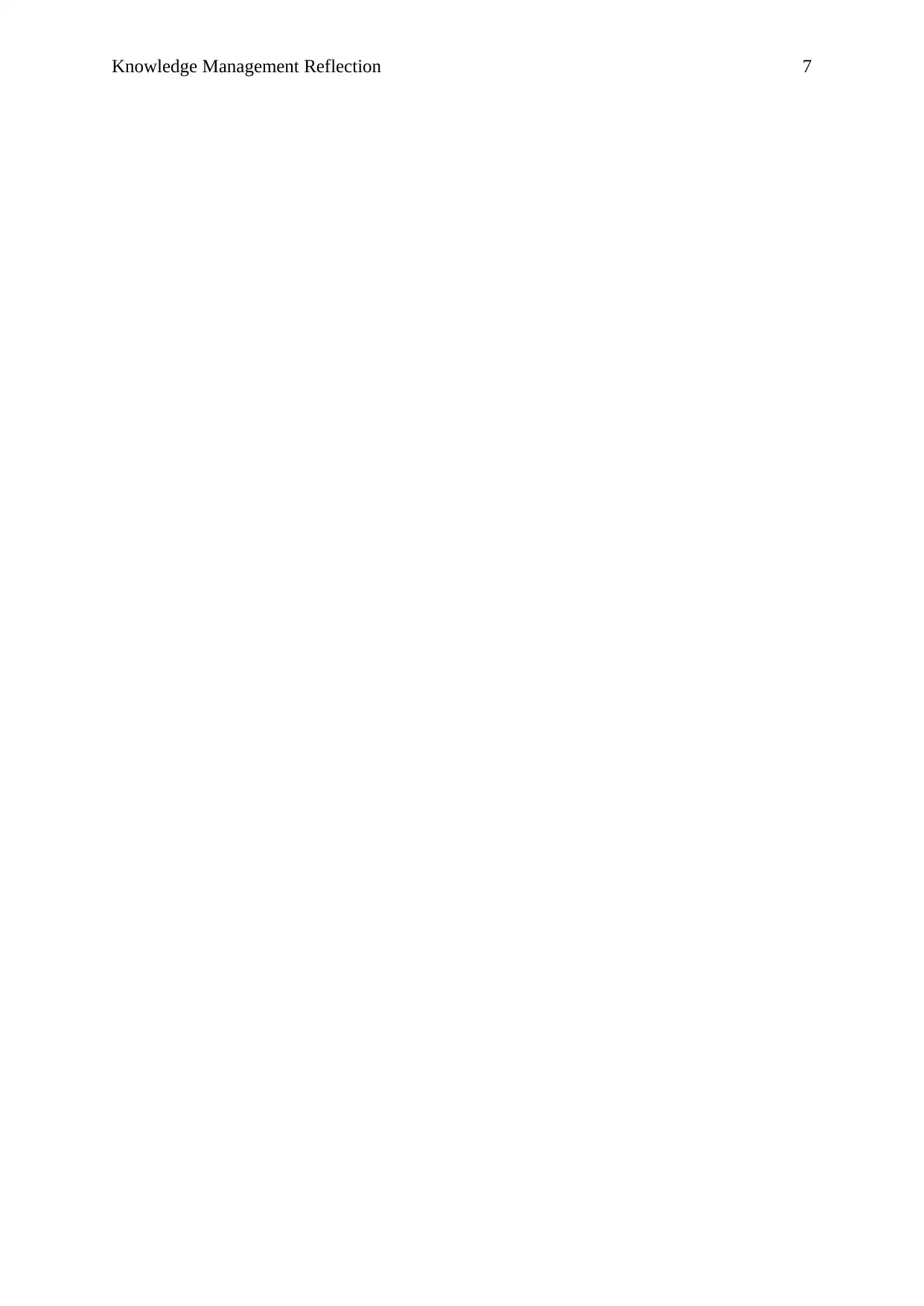
Knowledge Management Reflection 7
1 out of 8
Related Documents
Your All-in-One AI-Powered Toolkit for Academic Success.
+13062052269
info@desklib.com
Available 24*7 on WhatsApp / Email
![[object Object]](/_next/static/media/star-bottom.7253800d.svg)
Unlock your academic potential
Copyright © 2020–2026 A2Z Services. All Rights Reserved. Developed and managed by ZUCOL.




